Happy New Year, everybody.
Keen followers of the Bird of the Year Awards will notice a change in the categories this year. Butterflies and moths receive a disproportionate amount of my insecty attention, so I think it makes sense to split them out into their own category. Realistically, I could just split all invertebrates into ‘butterflies and moths’ and ‘other’, but I think it’s good to sit back at the end of the year and try to think of an interesting spider or slug or sea urchin or something.
Best Plant
I went on a lovely holiday in Portugal in the spring, and I mainly chose the timing for the flowers. Everyone goes to the Mediterranean at the wrong time of year. It may not be as hot at the end of April as it is in August, but the whole countryside is full of flowers and birdsong.
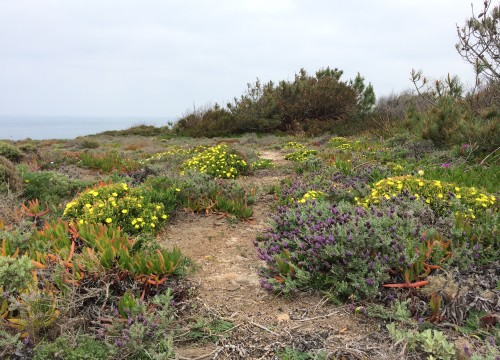
So I was walking along the Atlantic coast of Portugal, and the cliffs were covered in drifts of rockroses — pale yellow, strong yellow, white, pink — but there was also French lavender, thrift, big Spanish broom, little compact mounds of broom with pale yellow flowers, maybe eight or nine different orchids, wild gladioli, amazing vivid blue pimpernels. And sometimes I’d put my backpack down and get a great waft of wild thyme.
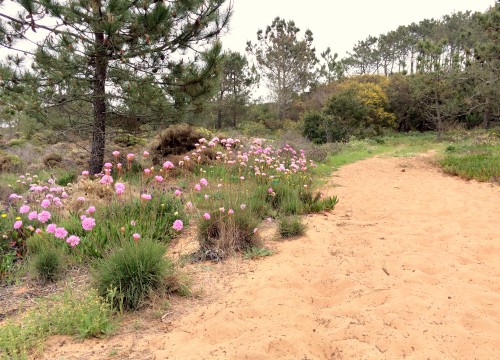
But I have to pick one. Among the various orchids, I was pleased to find these plants of a tongue orchid which is normally burgundy red:
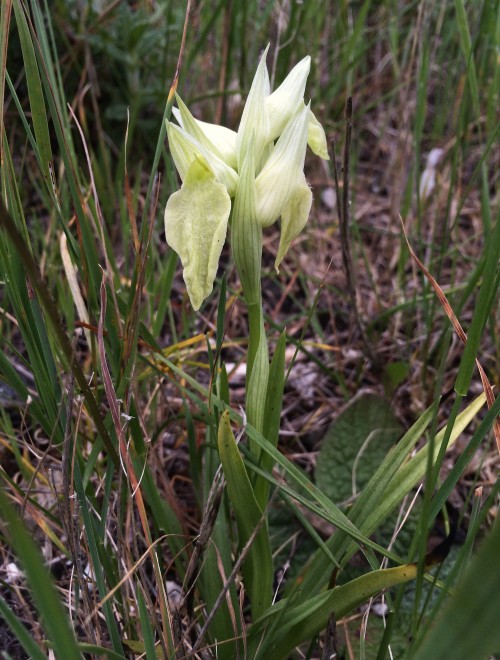
But perhaps perversely, I’m not going to pick a flower; my plant of the year is the cork oak:
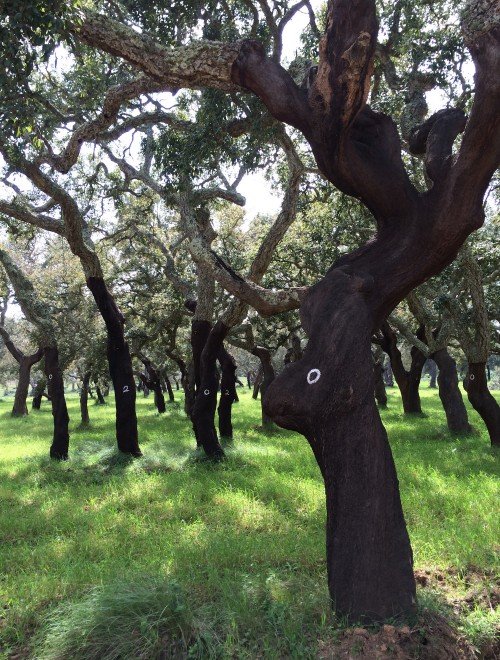
The numbers on the bark are to keep track of when each tree’s bark was last harvested. The combination of the dark naked trunks and greyish bark sleeves is rather charming, I think.
Best Butterfly or Moth
I made an effort to tick off a few more British butterfly species this year, and had four life firsts. But they were very much butterflies for the connoisseur; by which I mean they look… unspectacular. The names give you some idea: Essex Skipper, Small Blue, Grizzled Skipper, Dingy Skipper. The Small Blue is indeed remarkably small, but it’s not very blue; the Essex Skipper is distinguished from the Small Skipper by the colour of the undersides of the antennae; and the other two skippers are grizzled and dingy.
I also saw green hairstreak for the first time in Britain, which is a genuinely pretty butterfly, with iridescent green underwings; but I have seen them before in France. And a few attractive moths, like Clouded Buff, and this Buff Ermine, seen here on the classic habitat of a railway station toilet door:

But the winner is again from Portugal, a kind of butterfly I have wanted to see for years because it’s an exotic-looking European species not found in the UK: a Festoon. To be exact, this is a Spanish Festoon:
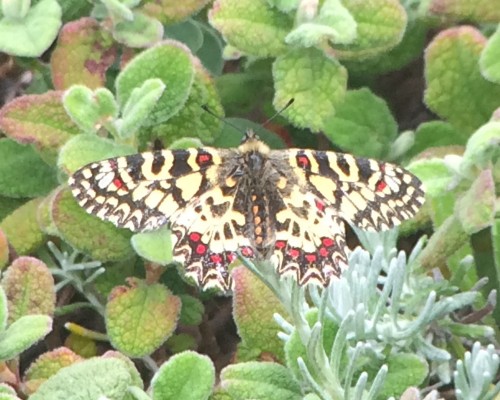
It’s rather a worn specimen, and it’s a terrible picture taken with my phone through my binoculars, but it’s my butterfly of the year.
Best Insect (other)
The most exciting non-lepidopteran insects I saw this year in the UK were ruby-tailed wasp (so shiny!) and velvet ant (actually a furry wingless wasp, dontcha know). Although the most photogenic might be this dor beetle:
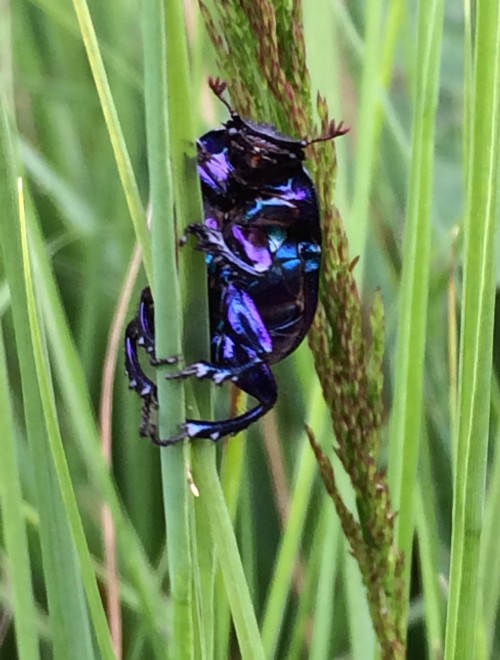
But I also saw some good beetles in Portugal, like this spotty hairy chafer which I think is probably Oxythyrea funesta (but usually when I think I’ve identified an insect and I consult an entomologist, they tell me I would need to check its genitalia under a microscope to be sure):
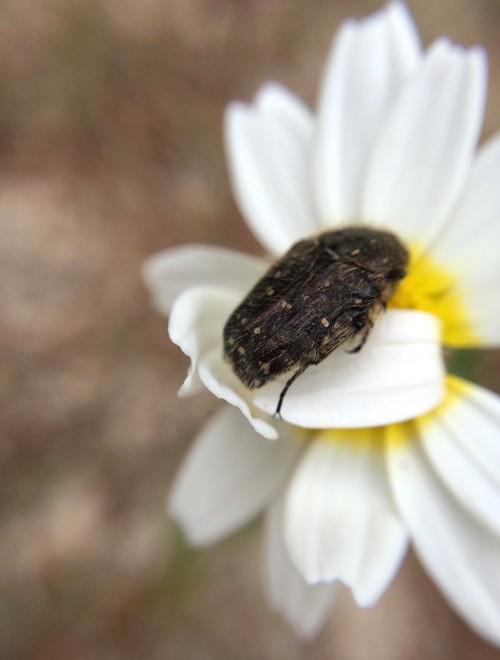
And there was this grotesque mammoth which, I learned later, is an oil beetle:
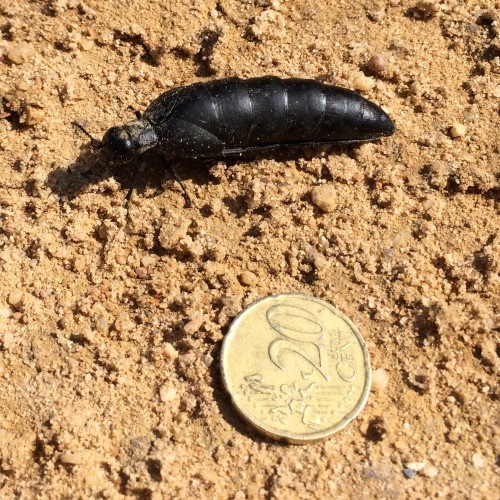
But I’m going for this spiky beetle as my best insect (other) for 2014. According to the coleopterist I consulted on Twitter, it’s probably Sepidium bidentatum:
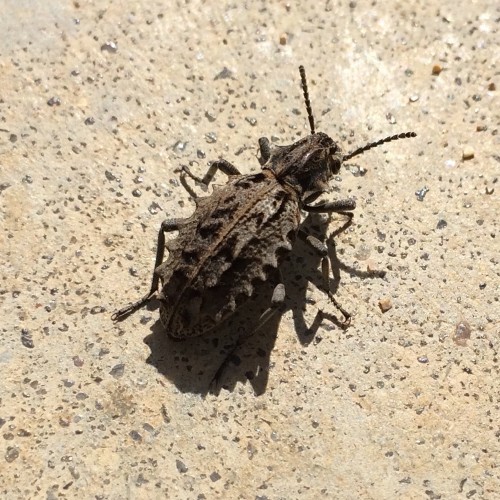
Best Invertebrate (other)
So I was walking along in Portugal and thought oh, what’s that pink flower the bumblebee is feeding on…
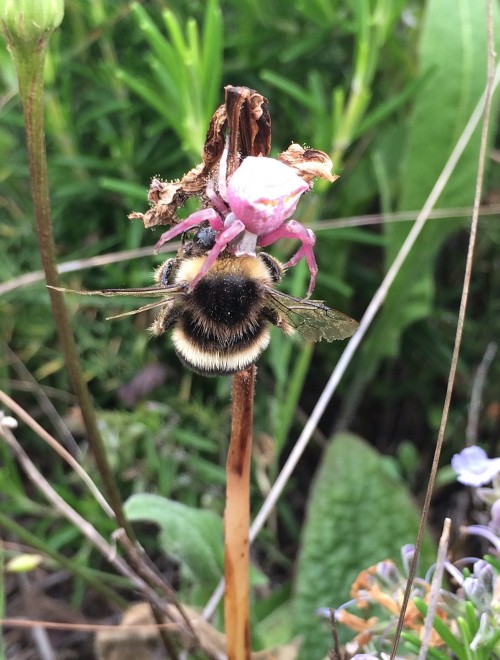
As it turns out, the bumblebee was not the one doing the feeding. That is a pink crab spider, possibly Thomisus onustus.
But my invertebrate of the year is the wasp spider Argiope bruennichi. These have been spreading rapidly across the south of England in the last ten years, helped by a combination of global warming and, I learn from Google, new-found genetic diversity after global warming allowed previously isolated populations to interbreed. It may be a sign of the coming apocalypse, but it’s a handsome beastie which I’ve been trying to see for a couple of years:
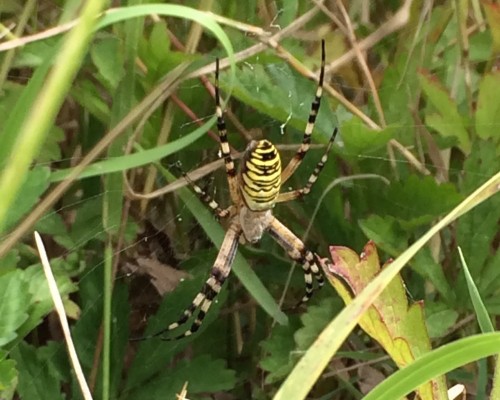
Best Reptile
I saw a grass snake trying to eat a frog in the woods at Bookham Common. I did take a couple of pictures of snake belly in thick grass, but they’re not worth sharing.
Best Fish
No, I’ve got nothing.
Best Amphibian
I’ve seen the usual common frogs and toads — lots of tadpoles in the pond this year — but nothing notable.
Best Mammal
An Egyptian Mongoose in Portugal. I just googled this to check, and apparently it was always assumed that these were an introduced species in Iberia — because of a lack of fossil evidence and the distance from the nearest wild African populations — but there are fossils in North Africa, and recent genetic testing suggests the Iberian mongooses are the descendants of some of those North African animals that presumably crossed over at Gibraltar in the Pleistocene, when there was no sea there.
Either way, it was a neat surprise; I didn’t know they were there.
Best Ecosystem
Obviously the Portuguese cliff-tops were great, the pine scrub was a delight, but my choice is the steppes of Alentejo, where I went with a hired bird guide for a great days birdwatching. I imagine in summer they are baked dry, but when I was there it was gently rolling green fields with flowers forming great hazy patches of colour. I only took a couple of pictures and they don’t do it justice, but here’s one I took through a telescope, admittedly with the saturation punched up a bit, that gives you some idea.
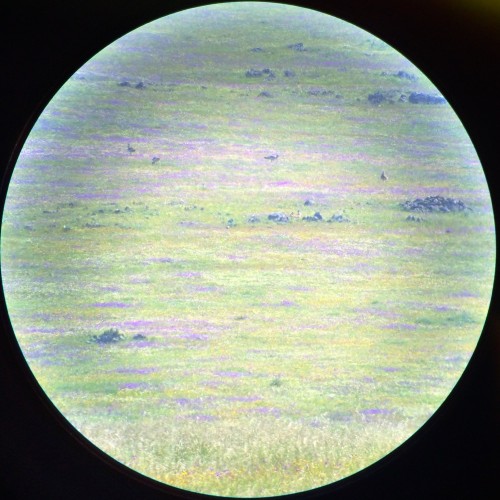
There are actually some birds in that picture, which is why I took it; but they can wait for the main Bird of the Year 2014 post.